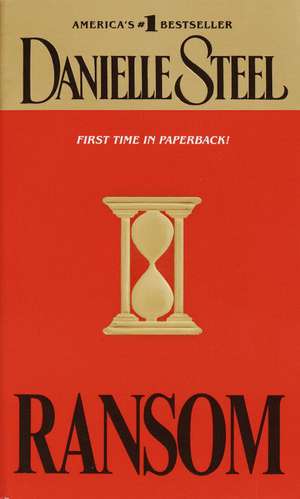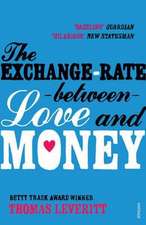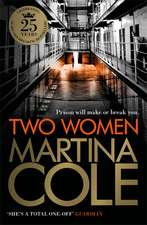Ransom
Autor Danielle Steelen Limba Engleză Paperback – 31 dec 2004
Outside the gates of a California prison, Peter Morgan is released after four long years and vows to redeem himself in the eyes of the young daughters he left behind. Simultaneously, Carl Waters, a convicted murderer, is set on the path of freedom with him. That night, three hundred miles south in San Francisco, police detective Ted Lee comes home to a silent house; for twenty-nine years, he has been living for his job—and slowly falling out of love with his wife. Across town, in an exclusive Pacific Heights neighborhood, a mother tries to shield her three children from the panic rising within her. Four months after her husband’s death, Fernanda Barnes faces a mountain of debt she cannot repay, a world destroyed, and a marriage lost.
Within weeks, the lives of these four people will collide in ways none of them could have foreseen. For Fernanda, whose life had once been graced by beautiful homes, security, success, and stunning wealth, the death of her brilliant, brooding husband was already too much to bear. She simply couldn’t imagine a greater loss, until a devastating crime rocks her family to its core—and brings Detective Ted Lee into her life.
A man of unshakable integrity, Lee will soon become the one person who tries to save Fernanda’s family from a terrifying fate. Fernanda must draw on a strength she never knew she had. Racing against time in the underbelly of the criminal world, buffeted by the dark side of power, and unmoored by loss and betrayal, no one can predict where this tragedy will take them.
Danielle Steel brilliantly explores the collision of a shocking crime with the ordinary lives of its victims in a novel that mesmerizes from start to finish. Ransom is at once a riveting evocation of life’s inexplicable turns of fate and a testament to the human will to survive.
From the Hardcover edition.
Preț: 46.77 lei
Nou
Puncte Express: 70
Preț estimativ în valută:
8.95€ • 9.37$ • 7.41£
8.95€ • 9.37$ • 7.41£
Carte indisponibilă temporar
Doresc să fiu notificat când acest titlu va fi disponibil:
Se trimite...
Preluare comenzi: 021 569.72.76
Specificații
ISBN-13: 9780440240761
ISBN-10: 044024076X
Pagini: 400
Dimensiuni: 108 x 180 x 27 mm
Greutate: 0.2 kg
Editura: dell
ISBN-10: 044024076X
Pagini: 400
Dimensiuni: 108 x 180 x 27 mm
Greutate: 0.2 kg
Editura: dell
Notă biografică
Danielle Steel has been hailed as one of the world’s most popular authors, with over 570 million copies of her novels sold. Her many international bestsellers include Rogue, Honor Thyself, Amazing Grace, Bungalow 2, Sisters, H.R.H., and other highly acclaimed novels. She is also the author of His Bright Light, the story of her son Nick Traina’s life and death.
From the Hardcover edition.
From the Hardcover edition.
Extras
Chapter 1
Peter Matthew Morgan stood at the counter, picking up his things. A wallet with four hundred dollars in it, from his cash account. The release papers he had to take with him, and give his parole agent. He was wearing clothes the state had given him. He was wearing jeans, a white T-shirt with a denim shirt over it, running shoes, and white socks. It was a far cry from what he had worn when he came in. He had been in Pelican Bay State Prison for four years and three months. He had served the minimum amount of time of his sentence, which was nonetheless a big hunk of time for a first offense. He had been caught with an extraordinary amount of cocaine, prosecuted by the state, convicted in a jury trial, and sentenced to State Prison at Pelican Bay.
At first, he had only sold to friends. Eventually, it not only supported the habit he had developed inadvertently, it supported all his financial needs and at one time his family's as well. He had made nearly a million dollars in the six months before he'd been caught, but even that didn't fill the hole in the dam he'd created with the financial juggling he'd done. Drugs, bad investments, selling short, huge risks on commodities. He'd been a stockbroker for a while, and got in trouble with the SEC, not enough to be prosecuted, in which case he would have been arrested by the feds and not the state, but he never was. He had been living so far beyond his means, to such an insane degree, had so many potentially explosive balls in the air, and developed such a massive drug habit hanging out with the wrong people, that eventually the only way to negotiate his debt to his dealer had been to deal drugs for him. There had also been a small matter of bad checks and embezzlement, but he got lucky once again. His employer had decided not to press charges, once he got arrested for dealing cocaine. What was the point? He didn't have the money anyway, whatever he had taken, and it was in fact a relatively small amount in the scheme of things, and the money was long gone. There was no way he could recoup the funds. His employer at the time felt sorry for him. Peter had a way of charming people, and making them fond of him.
Peter Morgan was the epitome of a nice guy gone wrong. Somewhere along the way, he had opted for the low road too many times, and blown every golden opportunity he'd ever had. More than Peter, his friends and business associates felt sorry for his wife and kids, who became the victims of his crazy schemes and rotten judgment. But everyone who knew him would have said that at the core, Peter Morgan was a nice guy. It was hard to say what had gone wrong. In truth, a lot had, for a long time.
Peter's father died when he was three, and had been the scion of an illustrious family from the cream of social circles in New York. The family fortune had been dwindling for years, and his mother managed to squander whatever his father left, long before Peter grew up. Soon after his father died, she married another very social, aristocratic young man. He was the heir of an important banking family, who was devoted to Peter and his two siblings, educated and loved them, sent them to the best private schools, along with the two half-brothers who came into Peter's life during the course of their marriage. The family appeared wholesome, and moneyed certainly, although his mother's drinking increased steadily over time, and wound her up in an institution eventually, leaving Peter and his two full siblings technically orphaned. His stepfather had never legally adopted them, and remarried a year after Peter's mother died. His new wife saw no reason why her husband should be burdened, financially or otherwise, with three children who weren't his own. She was willing to take on the two children he had had by that marriage, although she wanted them sent away to boarding school. But she wanted nothing to do with the three children that had come into his previous marriage, with Peter's mother. All Peter's stepfather was willing to do after that was pay for boarding school, and then college, and an inadequate allowance, but he explained, somewhat sheepishly, that he could no longer offer them haven in his home, nor additional funds.
After that, Peter's vacations were spent at school, or at the homes of friends, whom he managed to charm into taking him home. And he was very charming. Once his mother died, Peter learned to live by his wits. It was all he had, and worked well for him. The only love and nurturing he got in those years were from friends' parents.
There were often little incidents, when he stayed with friends during school holidays. Money disappeared, tennis rackets vanished mysteriously, and seemed to be missing when he left. Clothes were borrowed and never returned. Once a gold watch seemed to evaporate into thin air, and a sobbing maid was fired as a result. As it so happened, it was later discovered, Peter had been sleeping with her. He was sixteen at the time, and the proceeds from the watch that he had talked her into pilfering for him had kept him going for six months. His life was a constant struggle to come up with enough money to cover his needs. And he did whatever he had to do to meet those needs. He was so kind, polite, and pleasant to have around, that he always appeared innocent when things went sour. It was impossible to believe that a boy like him could be guilty of any misdeed or crime.
At one point, a school psychologist suggested that Peter had sociopathic tendencies, which even the headmaster found hard to believe. The psychologist had wisely surmised that under the veneer, he appeared to have less of a conscience than he should. And the veneer was incredibly appealing. It was hard to know who Peter really was beneath the surface. Above all, he was a survivor. He was a charming, bright, good-looking kid, who had had a bunch of rotten breaks in his life. He had no one to rely on but himself, and deep at his core, he had been wounded. His parents' deaths, his stepfather's distancing himself from him, and giving him almost no money, the two siblings he never saw once they were sent to different boarding schools on the East Coast, had all taken a toll on him. And later, once in college, the news that his eighteen-year-old sister had drowned was yet another blow to a young soul already battered. He rarely talked about the experiences he'd had, or the sorrows that had resulted from them, and on the whole, he appeared to be a level-headed, optimistic, good-natured guy, who could charm just about anyone, and often did. But life had been far from easy for him, although to look at him, you'd never know it. There was no visible evidence of the agonies he'd been through. The scars were far deeper and well hidden.
Women fell into his hands like fruit off trees, and men found him good company. He drank a lot in college, friends remembered later on, but he never seemed out of control, and wasn't. Not obviously at least. The wounds on Peter's soul were deep, and hidden.
Peter Morgan was all about control. And he always had a plan. His stepfather lived up to his promise, and sent him to Duke, and from there he got a full scholarship to Harvard Business School, and graduated with an MBA. He had all the tools he needed, along with a fine mind, good looks, and some valuable connections he'd made in the elite schools he had attended. It seemed an absolute certainty that he was someone who would go far. There was no question in anyone's mind that Peter Morgan would succeed. He was a genius with money, or so it seemed, and he had a multitude of plans. He got a job on Wall Street when he graduated, in a brokerage firm, and it was two years after he graduated that things started to go wrong. He broke some rules, churned some accounts, "borrowed" a little money. Things got dicey for him for a while, and then, as usual, he landed on his feet. He went to work for an investment banking firm, and appeared to be the golden boy of Wall Street for a brief time. He had everything it took to make a success of his life, except a family and a conscience. Peter always had a scheme, and a plan to get to the finish line faster. He had learned one thing from his childhood, that life could fall apart in an instant, and he had to take care of himself. There were few, if any, lucky breaks in life. And whatever luck there was, you made yourself.
At twenty-nine, he married Janet, a dazzling debutante, who happened to be the daughter of the head of the firm where he worked, and within two years, they had two adorable little girls. It was the perfect life, he loved his wife and was crazy about his kids. It looked like a long stretch of smooth road ahead of him finally, when for no reason anyone could fathom, things started to go wrong again. All he talked about was making a lot of money, and seemed obsessed with that idea, whatever it took. Some thought he was having too much fun. It was all too easy for him. He had fallen into a golden life, played too hard, got greedy, and inch by inch, he let life get out of control. In the end, his shortcuts and old habit of taking what he wanted did him in. He started cutting corners and making shaky deals, nothing he could be fired for, but nothing his father-in-law wanted to tolerate either. Peter appeared to be on a fast track, heading for danger. Peter and his father-in-law had several serious talks, while walking the grounds of his parents-in-law's estate in Connecticut, and Janet's father thought he had made the point. To put it simply, he had tried to point out to Peter that there was no such thing as a free lunch or an express train to success. He warned him that the kind of deals he was making, and the sources he used, would come back to haunt him one day. Possibly even very soon. He lectured him about the importance of integrity, and felt sure that Peter would heed him. He liked him. In fact, all he succeeded in doing was make Peter feel anxious and pressured.
At thirty-one, first for the "fun of it," Peter started doing drugs. There was no real harm in it, he claimed, everyone was doing them, and it made everything more amusing and exciting. Janet was worried sick about it. By thirty-two, Peter Morgan was in big trouble, losing control over his drug habit, despite his protests to the contrary, and started running through his wife's money, until his father-in-law cut him off. A year later, he was asked to leave the firm, and his wife moved in with her parents, devastated and traumatized by the experiences she'd had at Peter's hands. He was never abusive to her, but he was constantly high on cocaine, and his life was completely out of control. It was then that her father discovered the debts he'd incurred, the money he'd "discreetly" embezzled from the firm, and given their relationship with him, and the potential embarrassment to them, and Janet, they covered his debts. He agreed to give Janet full custody of the girls, who were by then two and three. He lost his visiting rights subsequently, over an incident involving him, three women, and a large stash of cocaine on a yacht off East Hampton. His children had been visiting him at the time. The nanny had called Janet on her cell phone from the boat. And Janet had threatened to call the Coast Guard on him. He got the nanny and the girls off the boat, and Janet wouldn't let him see them again. But by then he had other problems. He had borrowed massive amounts of money to support his drug habit, and lost what money he had on high-risk investments in the commodities market. After that, no matter how good his credentials, or how smart he was, he couldn't get a job. And just as his mother had before she died, he spiraled down. He was not only short of money, but addicted to drugs.
Two years after Janet left him, he tried to get a job with a well-known venture capital firm in San Francisco, and couldn't. He was in San Francisco by then anyway, and settled into selling cocaine instead. He was thirty-five years old, and had half the world after him for bad debts, when he was arrested for possession of a massive amount of cocaine with intent to sell. He had been making a fortune at it, but owed five times as much when he was arrested, and had some frightening debts to some very dangerous people. As people who knew him said when they heard, he had had everything going for him, and managed to blow all of it to kingdom come. He was in debt for a fortune, in danger of being killed by the dealers who sold to him, and the people behind the scenes who financed them, when he was arrested. He had paid no one back. He didn't have the money to do it. Most of the time, in cases like that, when people went to prison, the debts were canceled, if not forgotten. In dire cases, people got killed in prison for them. Or if you were lucky, they let it go. Peter hoped that would be the case.
When Peter Morgan went to prison, he hadn't seen his children in two years, and wasn't likely to again. He sat stone-faced through his trial, and sounded intelligent and remorseful when he took the stand. His lawyer tried to get him probation, but the judge was smarter than that. He had seen people like Peter before, though not many, and certainly not one who'd had as many opportunities that he'd blown. He had read Peter well, and saw that there was something disturbing about him. His appearance and his actions didn't seem to fit. The judge didn't buy the pat phrases of remorse that Peter parroted. He seemed smooth, but not sincere. He was likable certainly, but the choices he'd made were appalling. And when the jury found him guilty, the judge sentenced him to seven years in prison, and sent him to Pelican Bay, in Crescent City, a maximum security prison, inhabited by 3,300 of the worst felons in the California prison system, three hundred and seventy miles north of San Francisco, eleven miles from the Oregon border. It seemed like an unduly harsh sentence for Peter and not where he belonged.
From the Hardcover edition.
Peter Matthew Morgan stood at the counter, picking up his things. A wallet with four hundred dollars in it, from his cash account. The release papers he had to take with him, and give his parole agent. He was wearing clothes the state had given him. He was wearing jeans, a white T-shirt with a denim shirt over it, running shoes, and white socks. It was a far cry from what he had worn when he came in. He had been in Pelican Bay State Prison for four years and three months. He had served the minimum amount of time of his sentence, which was nonetheless a big hunk of time for a first offense. He had been caught with an extraordinary amount of cocaine, prosecuted by the state, convicted in a jury trial, and sentenced to State Prison at Pelican Bay.
At first, he had only sold to friends. Eventually, it not only supported the habit he had developed inadvertently, it supported all his financial needs and at one time his family's as well. He had made nearly a million dollars in the six months before he'd been caught, but even that didn't fill the hole in the dam he'd created with the financial juggling he'd done. Drugs, bad investments, selling short, huge risks on commodities. He'd been a stockbroker for a while, and got in trouble with the SEC, not enough to be prosecuted, in which case he would have been arrested by the feds and not the state, but he never was. He had been living so far beyond his means, to such an insane degree, had so many potentially explosive balls in the air, and developed such a massive drug habit hanging out with the wrong people, that eventually the only way to negotiate his debt to his dealer had been to deal drugs for him. There had also been a small matter of bad checks and embezzlement, but he got lucky once again. His employer had decided not to press charges, once he got arrested for dealing cocaine. What was the point? He didn't have the money anyway, whatever he had taken, and it was in fact a relatively small amount in the scheme of things, and the money was long gone. There was no way he could recoup the funds. His employer at the time felt sorry for him. Peter had a way of charming people, and making them fond of him.
Peter Morgan was the epitome of a nice guy gone wrong. Somewhere along the way, he had opted for the low road too many times, and blown every golden opportunity he'd ever had. More than Peter, his friends and business associates felt sorry for his wife and kids, who became the victims of his crazy schemes and rotten judgment. But everyone who knew him would have said that at the core, Peter Morgan was a nice guy. It was hard to say what had gone wrong. In truth, a lot had, for a long time.
Peter's father died when he was three, and had been the scion of an illustrious family from the cream of social circles in New York. The family fortune had been dwindling for years, and his mother managed to squander whatever his father left, long before Peter grew up. Soon after his father died, she married another very social, aristocratic young man. He was the heir of an important banking family, who was devoted to Peter and his two siblings, educated and loved them, sent them to the best private schools, along with the two half-brothers who came into Peter's life during the course of their marriage. The family appeared wholesome, and moneyed certainly, although his mother's drinking increased steadily over time, and wound her up in an institution eventually, leaving Peter and his two full siblings technically orphaned. His stepfather had never legally adopted them, and remarried a year after Peter's mother died. His new wife saw no reason why her husband should be burdened, financially or otherwise, with three children who weren't his own. She was willing to take on the two children he had had by that marriage, although she wanted them sent away to boarding school. But she wanted nothing to do with the three children that had come into his previous marriage, with Peter's mother. All Peter's stepfather was willing to do after that was pay for boarding school, and then college, and an inadequate allowance, but he explained, somewhat sheepishly, that he could no longer offer them haven in his home, nor additional funds.
After that, Peter's vacations were spent at school, or at the homes of friends, whom he managed to charm into taking him home. And he was very charming. Once his mother died, Peter learned to live by his wits. It was all he had, and worked well for him. The only love and nurturing he got in those years were from friends' parents.
There were often little incidents, when he stayed with friends during school holidays. Money disappeared, tennis rackets vanished mysteriously, and seemed to be missing when he left. Clothes were borrowed and never returned. Once a gold watch seemed to evaporate into thin air, and a sobbing maid was fired as a result. As it so happened, it was later discovered, Peter had been sleeping with her. He was sixteen at the time, and the proceeds from the watch that he had talked her into pilfering for him had kept him going for six months. His life was a constant struggle to come up with enough money to cover his needs. And he did whatever he had to do to meet those needs. He was so kind, polite, and pleasant to have around, that he always appeared innocent when things went sour. It was impossible to believe that a boy like him could be guilty of any misdeed or crime.
At one point, a school psychologist suggested that Peter had sociopathic tendencies, which even the headmaster found hard to believe. The psychologist had wisely surmised that under the veneer, he appeared to have less of a conscience than he should. And the veneer was incredibly appealing. It was hard to know who Peter really was beneath the surface. Above all, he was a survivor. He was a charming, bright, good-looking kid, who had had a bunch of rotten breaks in his life. He had no one to rely on but himself, and deep at his core, he had been wounded. His parents' deaths, his stepfather's distancing himself from him, and giving him almost no money, the two siblings he never saw once they were sent to different boarding schools on the East Coast, had all taken a toll on him. And later, once in college, the news that his eighteen-year-old sister had drowned was yet another blow to a young soul already battered. He rarely talked about the experiences he'd had, or the sorrows that had resulted from them, and on the whole, he appeared to be a level-headed, optimistic, good-natured guy, who could charm just about anyone, and often did. But life had been far from easy for him, although to look at him, you'd never know it. There was no visible evidence of the agonies he'd been through. The scars were far deeper and well hidden.
Women fell into his hands like fruit off trees, and men found him good company. He drank a lot in college, friends remembered later on, but he never seemed out of control, and wasn't. Not obviously at least. The wounds on Peter's soul were deep, and hidden.
Peter Morgan was all about control. And he always had a plan. His stepfather lived up to his promise, and sent him to Duke, and from there he got a full scholarship to Harvard Business School, and graduated with an MBA. He had all the tools he needed, along with a fine mind, good looks, and some valuable connections he'd made in the elite schools he had attended. It seemed an absolute certainty that he was someone who would go far. There was no question in anyone's mind that Peter Morgan would succeed. He was a genius with money, or so it seemed, and he had a multitude of plans. He got a job on Wall Street when he graduated, in a brokerage firm, and it was two years after he graduated that things started to go wrong. He broke some rules, churned some accounts, "borrowed" a little money. Things got dicey for him for a while, and then, as usual, he landed on his feet. He went to work for an investment banking firm, and appeared to be the golden boy of Wall Street for a brief time. He had everything it took to make a success of his life, except a family and a conscience. Peter always had a scheme, and a plan to get to the finish line faster. He had learned one thing from his childhood, that life could fall apart in an instant, and he had to take care of himself. There were few, if any, lucky breaks in life. And whatever luck there was, you made yourself.
At twenty-nine, he married Janet, a dazzling debutante, who happened to be the daughter of the head of the firm where he worked, and within two years, they had two adorable little girls. It was the perfect life, he loved his wife and was crazy about his kids. It looked like a long stretch of smooth road ahead of him finally, when for no reason anyone could fathom, things started to go wrong again. All he talked about was making a lot of money, and seemed obsessed with that idea, whatever it took. Some thought he was having too much fun. It was all too easy for him. He had fallen into a golden life, played too hard, got greedy, and inch by inch, he let life get out of control. In the end, his shortcuts and old habit of taking what he wanted did him in. He started cutting corners and making shaky deals, nothing he could be fired for, but nothing his father-in-law wanted to tolerate either. Peter appeared to be on a fast track, heading for danger. Peter and his father-in-law had several serious talks, while walking the grounds of his parents-in-law's estate in Connecticut, and Janet's father thought he had made the point. To put it simply, he had tried to point out to Peter that there was no such thing as a free lunch or an express train to success. He warned him that the kind of deals he was making, and the sources he used, would come back to haunt him one day. Possibly even very soon. He lectured him about the importance of integrity, and felt sure that Peter would heed him. He liked him. In fact, all he succeeded in doing was make Peter feel anxious and pressured.
At thirty-one, first for the "fun of it," Peter started doing drugs. There was no real harm in it, he claimed, everyone was doing them, and it made everything more amusing and exciting. Janet was worried sick about it. By thirty-two, Peter Morgan was in big trouble, losing control over his drug habit, despite his protests to the contrary, and started running through his wife's money, until his father-in-law cut him off. A year later, he was asked to leave the firm, and his wife moved in with her parents, devastated and traumatized by the experiences she'd had at Peter's hands. He was never abusive to her, but he was constantly high on cocaine, and his life was completely out of control. It was then that her father discovered the debts he'd incurred, the money he'd "discreetly" embezzled from the firm, and given their relationship with him, and the potential embarrassment to them, and Janet, they covered his debts. He agreed to give Janet full custody of the girls, who were by then two and three. He lost his visiting rights subsequently, over an incident involving him, three women, and a large stash of cocaine on a yacht off East Hampton. His children had been visiting him at the time. The nanny had called Janet on her cell phone from the boat. And Janet had threatened to call the Coast Guard on him. He got the nanny and the girls off the boat, and Janet wouldn't let him see them again. But by then he had other problems. He had borrowed massive amounts of money to support his drug habit, and lost what money he had on high-risk investments in the commodities market. After that, no matter how good his credentials, or how smart he was, he couldn't get a job. And just as his mother had before she died, he spiraled down. He was not only short of money, but addicted to drugs.
Two years after Janet left him, he tried to get a job with a well-known venture capital firm in San Francisco, and couldn't. He was in San Francisco by then anyway, and settled into selling cocaine instead. He was thirty-five years old, and had half the world after him for bad debts, when he was arrested for possession of a massive amount of cocaine with intent to sell. He had been making a fortune at it, but owed five times as much when he was arrested, and had some frightening debts to some very dangerous people. As people who knew him said when they heard, he had had everything going for him, and managed to blow all of it to kingdom come. He was in debt for a fortune, in danger of being killed by the dealers who sold to him, and the people behind the scenes who financed them, when he was arrested. He had paid no one back. He didn't have the money to do it. Most of the time, in cases like that, when people went to prison, the debts were canceled, if not forgotten. In dire cases, people got killed in prison for them. Or if you were lucky, they let it go. Peter hoped that would be the case.
When Peter Morgan went to prison, he hadn't seen his children in two years, and wasn't likely to again. He sat stone-faced through his trial, and sounded intelligent and remorseful when he took the stand. His lawyer tried to get him probation, but the judge was smarter than that. He had seen people like Peter before, though not many, and certainly not one who'd had as many opportunities that he'd blown. He had read Peter well, and saw that there was something disturbing about him. His appearance and his actions didn't seem to fit. The judge didn't buy the pat phrases of remorse that Peter parroted. He seemed smooth, but not sincere. He was likable certainly, but the choices he'd made were appalling. And when the jury found him guilty, the judge sentenced him to seven years in prison, and sent him to Pelican Bay, in Crescent City, a maximum security prison, inhabited by 3,300 of the worst felons in the California prison system, three hundred and seventy miles north of San Francisco, eleven miles from the Oregon border. It seemed like an unduly harsh sentence for Peter and not where he belonged.
From the Hardcover edition.
Recenzii
"The world's most popular author tells a good, well-paced story and explores some important issues...Steel affirm[s] life while admitting its turbulence, melodramas, and misfiring passions."
--Booklist
"Danielle Steel writes boldly and with practiced vividness about tragedy--both national and personal...with insight and power."
--The Nashville Banner
From the Hardcover edition.
--Booklist
"Danielle Steel writes boldly and with practiced vividness about tragedy--both national and personal...with insight and power."
--The Nashville Banner
From the Hardcover edition.
Descriere
A violent crime brings together four lives in Steel's 60th bestselling novel, the story of a mother's courage, a family's terror, and a triumph of human strength and dignity in the face of overwhelming odds.














